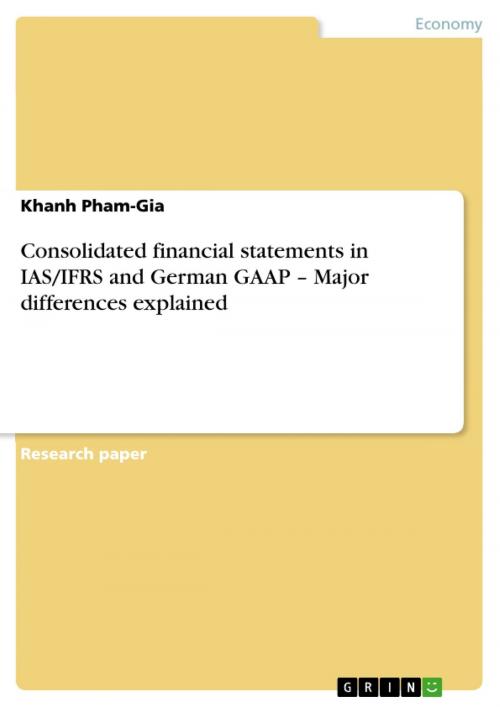Consolidated financial statements in IAS/IFRS and German GAAP - Major differences explained
Major differences explained
Business & Finance, Management & Leadership, Management| Author: | Khanh Pham-Gia | ISBN: | 9783640383337 |
| Publisher: | GRIN Verlag | Publication: | July 24, 2009 |
| Imprint: | GRIN Verlag | Language: | English |
| Author: | Khanh Pham-Gia |
| ISBN: | 9783640383337 |
| Publisher: | GRIN Verlag |
| Publication: | July 24, 2009 |
| Imprint: | GRIN Verlag |
| Language: | English |
Research Paper (undergraduate) from the year 2008 in the subject Business economics - Business Management, Corporate Governance, grade: 1,3, University of applied sciences, Munich, language: English, abstract: Due to a regulation of the European Union (EU) concerning financial accounting issued on June 6th, 2002, all listed companies in EU are obligated to provide their Consolidated Financial Statements (CFS) in accordance with financial accounting principles of International Accounting Standards (IAS) or International Financial Reporting Standards (IFRS) from January 1st, 2005. This regulation enables a necessary harmonization of accounting principles within the EU and supports a clear comparability of CFS worldwide. The object of this study is to analyze major differences of CFS in German GAAP and IAS/IFRS. Thereby, variations of both accounting standards are compared and a major difference is explained thoroughly with a concrete example. The major differences of CFS in IAS/IFRS and German GAAP result from different aims of both accounting standards. The German GAAP is strongly based on prudence principle for protection of creditors and authoritative principle (tax accounting based on commercial accounting). In comparison, the IAS/IFRS deliver potential investors realistic and decision useful information about assets, finance, and profit situations of a company (true and fair view / fair presentation principle). These basic principles could be reflected in several key points of the both accounting standards whose differences are clarified in this study. Furthermore, an essential key point of CFS namely the basis of consolidation (contains enterprises included in the consolidation and capital consolidation methods) is illuminated with a concrete example. Hereby, the relation between the control influence of the parent enterprise on its 'sub-entities' and the correspondent capital consolidation methods are studied.
Research Paper (undergraduate) from the year 2008 in the subject Business economics - Business Management, Corporate Governance, grade: 1,3, University of applied sciences, Munich, language: English, abstract: Due to a regulation of the European Union (EU) concerning financial accounting issued on June 6th, 2002, all listed companies in EU are obligated to provide their Consolidated Financial Statements (CFS) in accordance with financial accounting principles of International Accounting Standards (IAS) or International Financial Reporting Standards (IFRS) from January 1st, 2005. This regulation enables a necessary harmonization of accounting principles within the EU and supports a clear comparability of CFS worldwide. The object of this study is to analyze major differences of CFS in German GAAP and IAS/IFRS. Thereby, variations of both accounting standards are compared and a major difference is explained thoroughly with a concrete example. The major differences of CFS in IAS/IFRS and German GAAP result from different aims of both accounting standards. The German GAAP is strongly based on prudence principle for protection of creditors and authoritative principle (tax accounting based on commercial accounting). In comparison, the IAS/IFRS deliver potential investors realistic and decision useful information about assets, finance, and profit situations of a company (true and fair view / fair presentation principle). These basic principles could be reflected in several key points of the both accounting standards whose differences are clarified in this study. Furthermore, an essential key point of CFS namely the basis of consolidation (contains enterprises included in the consolidation and capital consolidation methods) is illuminated with a concrete example. Hereby, the relation between the control influence of the parent enterprise on its 'sub-entities' and the correspondent capital consolidation methods are studied.















